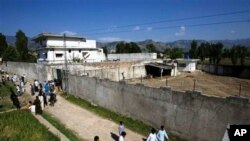It had long been assumed in many quarters that Osama bin Laden was hiding in some remote part of Pakistan’s tribal areas, perhaps in a small village or isolated cave. But he was found not in a cave but in a well-protected, high-walled compound in Abbottabad, a Pakistani city that is home to several major military installations, including the officers’ military academy. The bin Laden raid has put new tensions on an already strained U.S.-Pakistan relationship.
The discovery of Osama bin Laden in Abbottabad has raised sharp questions, the key one being, was he hiding, or was he being hidden by accomplices in Pakistan’s military or intelligence service?
Democratic Sen. Claire McCaskill of Missouri said the question is still open. "They were either knowledgeable or they’re incompetent. And I think we’re not sure yet which it is," she said.
Shaun Gregory, director of the Pakistan Security Research Unit at Britain’s University of Bradford, says it is inconceivable that Pakistan’s Inter-Services Intelligence directorate, the ISI, did not know bin Laden was there. "Is it really believable that this famous guy, [nearly 2 meters tall], moves around and manages to evade the United States for 10 years and the ISI, if we’re to believe that they’re hunting him? I think the answer to that is no," he said.
The ISI has been repeatedly accused of aiding some militant groups, notably the Afghan Taliban and Kashmiri separatist groups like Lashkar-i-Taiba. Pakistan has repeatedly denied that charge.
However, retired Australian Army officer Brian Cloughley, who served as military attaché in Islamabad and keeps in close contact with the Pakistani military, says the ISI keeps up contact with militant groups for intelligence purposes. He says he got this on no less authority that the Pakistani army chief, General Asfaq Kayani, whose previous job was director of the spy agency.
"All this stems from the fact that ISI - and Kayani told me this personally when he was DG [director-general of] ISI - ISI does talk to the bad guys. Now, this isn’t as stupid as it sounds. And as Kayani said to me, I do it because I like to know where they are. If I don’t talk to them, they’re going to go right underground, and I’ll never know where they are," he said.
But even if the ISI was aiding certain groups, it was widely assumed it would not protect the world’s most wanted man. However, Shaun Gregory says Osama bin Laden, a Saudi by birth, had powerful backers in his ancestral homeland. "You mustn’t lose sight of the relationship between rich and powerful Saudis and rich and powerful people in Pakistan, including in the military. There’s a whole sort of clandestine network here and relationship here that we simply don’t see in the Western media, that the Saudis give vast amounts of money to Pakistanis for certain things. My understanding is that Raymond Davis, for example, the blood money that was paid for him was paid by the Saudis. I think there’s some very powerful interests in Saudi that wanted to keep bin Laden safe," he said.
Davis is a reported CIA contractor who was arrested in Pakistan for killing two men he said were attempting to rob him. He was released after the families of the victims were paid $2.4 million from undisclosed sources, but the case further soured already strained U.S.-Pakistani relations.
It was also accepted wisdom that bin Laden would be in some remote part of Pakistan’s tribal areas. Analyst Larry Goodson of the U.S. Army War College says he does not know if bin Laden was hiding or being hidden in Abbottabad. But he adds that, given that U.S. aerial drones were searching high and low for the al-Qaida leader, being where he was found makes sense. "I’ll just say that whether he was hiding or being hidden, Abbottabad kept him far from the border, away from being easily hit by any kind of unmanned [aerial] vehicle, and where whoever was involved in the hiding could keep a good eye on him. So that’s why I think he was where he was," he said.
Lisa Curtis, South Asia Research Fellow at the Heritage Foundation, says building a fortified compound like bin Laden’s would have aroused suspicion, or at least curiosity, in the area and would - or should - have come to the attention of authorities. "It really defies credulity that they did not know more about who was in that compound, what they were doing. It seems very difficult to understand that. And I think that what we can say is that they were not prioritizing the hunt for bin Laden, or perhaps turning a blind eye," she said.
But Brian Cloughley says large fortified compounds are not so unusual as to draw scrutiny. The area is full of well-to-do people, including former military officers, who value privacy. "They’ve all got compounds. Small houses are within high-walled compounds. Everyone’s got high walls. There’s nothing unusual about it. And the people who live in places like Abbottabad are naturally withdrawn-type people, they’re retiring people. They don’t want interference. And they don’t interfere with other people," he said.
Congressional hearings are planned on what Pakistan might have known about Osama bin Laden’s whereabouts, and some members of Congress have called for a re-evaluation of U.S. aid to Pakistan.
Bin Laden Raid Raises Questions About Pakistan
- By Gary Thomas




